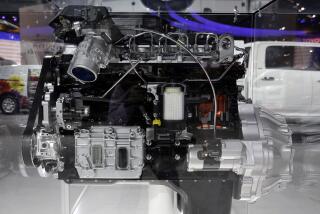Toyota, in settlement mode, reaches deal in W. Virginia acceleration case
- Share via
A day after opening talks to resolve hundreds of sudden-acceleration cases in federal and state court in California, Toyota Motor Corp. has settled a separate lawsuit, filed in West Virginia.
On Friday, the Japanese automaker reached a confidential agreement with Opal Gay Vance, whose 2010 Camry accelerated and crashed into a trailer and injured her back and neck, her attorney said.
The case had been scheduled to go to trial on Jan. 21, making it the next sudden-acceleration case Toyota was expected to face anywhere in the country.
“There seemed to be a pretty clear purpose on Toyota’s part to get a deal done” and keep the case out of court, attorney Edgar “Hike” Heiskell said. “There was a real sense of motivation on that side of the table.”
A spokeswoman for Toyota declined comment.
On Thursday, judges in U.S. District Court in Santa Ana and in Los Angeles County Superior Court issued orders opening an “intensive settlement process” between Toyota and nearly 300 plaintiffs claiming that defects caused their vehicles to suddenly accelerate, causing injury and, in some cases, death.
Those negotiations could help Toyota dispense with the great majority of the acceleration lawuits it still faces, and come closer to moving past an issue that has plagued it for more than four years.
Under the terms of the orders, all cases consolidated in those courtrooms are temporarily stayed while Toyota conducts case-by-case negotiations with each plaintiff. If a settlement cannot be reached, the cases would move to mediation and, finally, return to the trial calendar.
Such a global settlement -- as they are frequently referred to in legal circles -- would in many ways mirror deals struck by drug makers such as Merck, which has paid nearly $6 billion to settle more than 35,000 lawsuits over the drug Vioxx.
Toyota is unlikely to spend that much money to wrap up all pending sudden-acceleration cases, but the costs could run into the hundreds of millions of dollars or more. A key part of that process will be targeting cases such as the Vance suit, which is not subject to the court orders in California and thus was still on the Wayne County Circuit Court’s schedule.
In that case, Heiskell said, he and other attorneys were preparing to argue that defective electronics, and particularly throttle control software, led to the sudden acceleration event in 2010, which has left Vance with pain and some impairment.
That same claim found purchase in October with an Oklahoma jury, which found that faulty electronics in a 2005 Camry caused it to accelerate and crash, killing one woman and injuring another. The jury, in a state not known as being plaintiff-friendly, hit Toyota with a $3-million verdict.
Heiskell said he believes that verdict played a role in changing Toyota’s strategy on settlements. He said the automaker had been making offers for several months, but “we were quite far apart.” After the Oklahoma verdict, Toyota’s figure increased substantially.
In the last few years, Toyota has moved to settle a number of other sudden-acceleration cases and keep them out of court. The largest, which cost $1.6 billion, resolved a class action from motorists who claimed the sudden-acceleration problem reduced the value of their vehicles. In addition, Toyota has settled a number of personal injury and death cases, including a $10-million payout to the family of a California Highway Patrolman killed in a Lexus outside of San Diego in 2009.
Next on Toyota’s court docket is a case in Michigan involving a 77-year old woman, Guadalupe Alberto, whose 2005 Camry crashed into a tree in 2008, killing her. It’s scheduled for trial on Feb. 19.
Heiskell, who is also handling that case, declined comment on whether Toyota had attempted to settle it as well, as did another plaintiff attorney on the case, Eric Snyder.
Todd Walburg, a member of the plaintiffs’ steering committee for the sudden-acceleration cases consolidated in California, said he was pleased that Toyota had entered into the settlement stage, and that plaintiffs would have a wide degree of latitude.
The process will “provide immediate access to plaintiffs who would like to resolve their cases or the ability to determine whether a trial is in their best interest,” Walburg said.
ALSO:
Toyota looks to settle sudden acceleration lawsuits
Jury hits toyota with $3 million verdict in acceleration case
Jury awards $10 million in Toyota death but absolves automaker
Follow me on Twitter (@kenbensinger) and Facebook.
More to Read
Inside the business of entertainment
The Wide Shot brings you news, analysis and insights on everything from streaming wars to production — and what it all means for the future.
You may occasionally receive promotional content from the Los Angeles Times.










